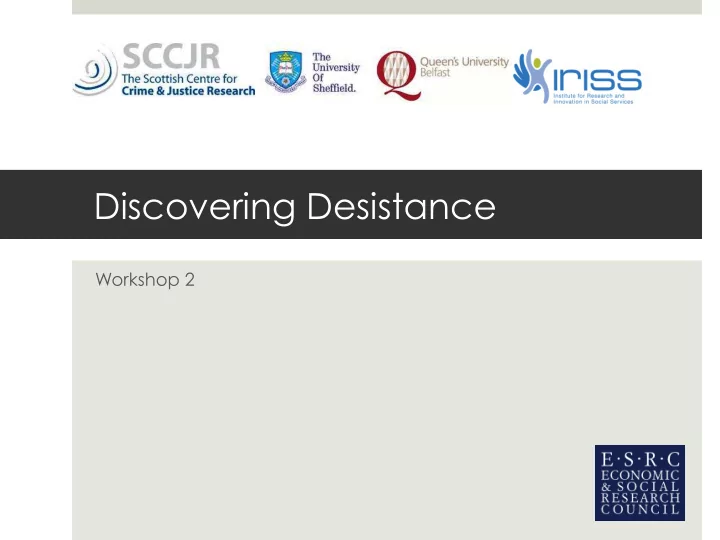

! ! ! ! Discovering Desistance Workshop 2 !
Programme ¤ 9.30am Arrival/tea & coffee ¤ 10-10.20 Welcome and film re-cap ¤ 10.20 -10.40 Reflections on first workshops; ¤ Have you done anything differently as a result of the first workshop? ¤ Update from all stage 1 workshops ¤ 10.40- 11 Voting for Provocative propositions ¤ 11-12.30 Design Phase ¤ 12.30 – 1.30 Lunch ¤ 1.30 - 2.30 Destiny Phase ¤ 2.30-3.15 Tea/coffee ¤ 3.15-4.00 Sharing reflections from, and about, the process and sum-up.
‘Appreciative Inquiry’ (AI) ¤ AI differs from other approaches to supporting change and development (usually in organisations) in that it AI involves a focus on best experiences, strengths, accomplishments, best practices, and ‘peak moments’ in a person’s, a service’s or an organisation’s history. It does not start with a problem orientation and then try to ‘fix’ the problems that are found. ¤ These workshops focus on what is working well to support desistance from crime and how we can make further progress in this area. They draw on the experiences of all of the participants and on the research evidence. ¤ We hope that the insights from the workshops in each country can produce a kind of cross-fertilisation of ideas as we work through the process.
Discovery phase ¤ This session focuses on exploring and appreciating ‘the best of what is’. The task is to discuss the factors and forces that have supported the desistance process. You could consider: ¤ Best experiences in being supported or supporting others to change ¤ Desistance-related achievements you are particularly proud of ¤ Which particular talents/skills/attitudes people bring to the change process (in whatever role) that make a difference in supporting change.
Dream phase ¤ Drawing on the examples of innovation or good practice/experiences that have been discussed in the discovery phase, images of the ‘possible future’ should emerge. In this phase the aim is to develop ‘ provocative propositions ’ that realistically sum up ‘what could be’, if services, practices, policies were redesigned to support desistance
Provocative propositions (London) 1. Every probation trust and prison should have active service user involvement which informs service delivery and policy 2. Statutory services need to be in a position to prioritise what is important/more autonomy 3. Reformed offenders should have the opportunity to have their record spent 4. Raise profile of probation in communities and improve interface with other public services/organisations 5. Probation offices/officers are connected with local communities 6. Language and culture shifted from punishment/public protection to reducing reoffending/ rehabilitation/ re-integration 7. Individualised and responsive practice should be prioritised using real service user feedback 8. We incentivise desistance, building up credit in prison for good behavior etc and then able to ‘buy’ resettlement package
Provocative propositions (London) 9. Criminal justice policy is driven by evidence of what works rather than fear 10. All society takes a responsibility for desistance (organisations, families and individuals) 11. Reduce prison population by 50% (especially women, black men, those with mental health issues and those on short sentences), with freed-up money used more effectively 12. Racism is eradicated within the criminal justice system (and wider society) 13. All probation offices look decent and comfortable; where people can feel like human beings 14. People being supported are told first about things that are about them 15. One probation officer sticks with you, if you want them to, and if there’s a change there’s a 3-way conversation first 16. Counseling technique training is required for all those working with people who have offended
Provocative propositions (London) 17. We focus on the positives, and what people have achieved 18. The meeting/work environment should be physically conducive to change 19. Co-production and partnership throughout the whole criminal justice system 20. Intensive Alternative to Custody to replace more custodial sentences, to get away from the short-term revolving door 21. All elements of the criminal justice system to actively recruit ex- offenders 22. Each London borough to have a team of paid ex-offender mentors 23. Re-branding the function of prison, from punishment to rehabilitation 24. 98% less people sent to prison
Provocative propositions (London) 25. Stop those with sentences under 12 month being sent to prison 26. Stop sending mentally ill people to prison 27. The criminal justice system (including Ministry of Justice and NOMS) to commence recruiting reformed offenders
Design phase ¤ Design Phase : Here, the focus is on designing a more ideal approach to supporting desistance, based on the examples that have emerged from the successes and achievements of the past. It requires us to think about what policies, practices and services might look like if they were designed in such a way as to better support desistance and to achieve the provocative propositions developed in the dream phase.
Destiny phase ¤ Destiny Phase : This session is centrally about ‘making change happen’. Here we will focus on what needs to be done to achieve the vision of the future established in the dream and design phases. This session will focus on identifying what participants can do to move towards better practices, services and policies, and identifying what others also need to do to make this happen.
Summing up ¤ Where have we got to so far? ¤ Phase 2 in Sheffield and Belfast ¤ ‘The Road from Crime’ and final project reports will be available via the blog soon: ¤ http://blogs.iriss.org.uk/discoveringdesistance/ ¤ Many thanks for your participation!
Recommend
More recommend